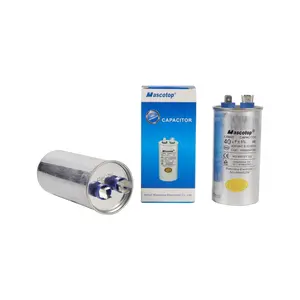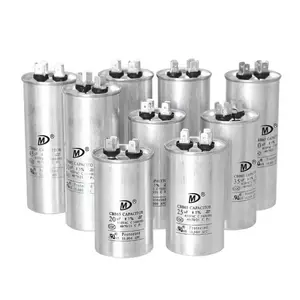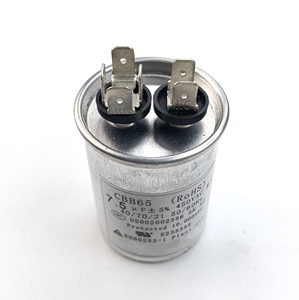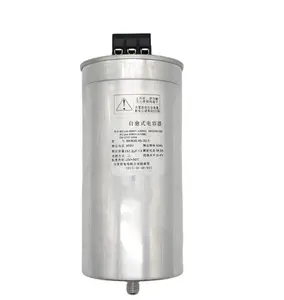Top categories

PCB & PCBA

Circuit Protection

Connectors, Terminals & Accessories

Telecommunications

Development Boards, Electronic Modules and Kits

Electronic Accessories & Supplies

Passive Components

Isolators

Audio Components and Products

Sensors

Displays, Signage and Optoelectronics

RF, Microwave and RFID

Discrete Semiconductors

Wireless & IoT Module and Products

Power Supplies

Relays
About products and suppliers
Introduction
Understanding the lifespan and functionality of your air compressor capacitor is crucial for maintaining the efficiency and longevity of your air conditioning system. This guide will provide a comprehensive overview of the role of capacitors in the compressor motor, the factors influencing their lifespan, and the signs of a failing capacitor. We will also offer valuable insights into maintaining and replacing your capacitor, ensuring optimal performance of your air conditioning system.
Comprehending Air Compressor Capacitors
Air compressor capacitors are vital for the operation of the compressor motor. They come in two types: start and run capacitors. Start capacitors provide a momentary increase in torque to help the motor start, while run capacitors modulate the current and voltage to the compressor motor's run windings for continuous operation. If either capacitor fails, the air compressor may not start or run properly.
Defining an Air Compressor Capacitor
An air compressor capacitor is an electronic component that connects to an air conditioning system's compressor unit. It stores and releases electrical energy to run the compressor at the initial start-up and during operation. This specialized electronic component typically resembles a small cylinder with terminals protruding from one end. The compressor capacitor connects directly to the compressor's electrical supply, maintaining a consistent power level for the compressor and fan motor, thereby ensuring long lifespans.
How Does a Capacitor Work in an Air Compressor?
Capacitors play a crucial role in air compressor motors, especially during the start phase. They provide a momentary increase in torque to help get the motor running. Run capacitors, on the other hand, modulate the current and voltage to the compressor motor's run windings, ensuring continuous operation. If either capacitor fails, your air compressor may not start or run properly.
Understanding the Lifespan of Air Compressor Capacitors
An air compressor capacitor, similar to other capacitors, can generally last up to 20 years. However, its longevity can be influenced by several factors. For instance, exposure to high heat can significantly shorten its lifespan as it loses its ability to hold an electrical charge. Moreover, if the air compressor cycles more rapidly than average, the capacitor will wear out more quickly due to the increased workload. Despite their robustness, capacitors are one of the most common components to fail due to their demanding role.
Factors Influencing the Lifespan of a Capacitor
The lifespan of air compressor capacitors is influenced by several environmental and electrical factors. The most critical among these is temperature, which includes both ambient temperature and internal heating due to ripple current. Other factors such as operating voltage, ripple current, and charge-discharge duty cycle also play a role. However, conditions like vibration, shock, and humidity have minimal impact on the actual life of the capacitor. The life of capacitors can be evaluated through accelerated life tests, which consider temperature, voltage, and ripple current acceleration factors.
Recognizing Signs of a Failing Capacitor
A failing capacitor in your air compressor can manifest in several ways. Warm air from your vents, unusual humming noises from the compressor unit, a burning smell from the unit, increased energy bills, or your air conditioner turning off suddenly or not turning on at all could all indicate a bad capacitor.
Maintaining and Replacing Your Capacitor
Routine preventive maintenance, including air compressor capacitor replacement, can help prolong your AC system’s lifespan. A failing capacitor may lead to frequent and unexpected system shutdowns, potentially damaging other AC system components. By replacing your capacitor with a standard one, you can protect your AC system from potential damage and extend its lifespan. The standard capacitor is easy to install, making it a convenient solution for maintaining your air conditioning system.
Routine Maintenance Tips
Routine maintenance of your air compressor is crucial for its longevity and efficiency. Regularly check the intake filter to prevent debris from damaging the system. Monitor the compressor oil levels and replace it after a certain period of operation, similar to car engine oil. Inspect belts, couplings, and electric motors for any potential issues. Pay attention to the Air/Oil Separators and internal filters to ensure optimal performance. Lastly, the unloader valve should function properly to prevent the compressor from working harder than necessary. Always consult with the manufacturer for specific maintenance guidelines.
When and How to Replace Your Capacitor
Replacing an air compressor capacitor involves a series of steps. First, diagnose the issue by checking if the fan blade spins freely when the A/C is turned on. If it doesn't, the capacitor might be faulty. Disconnect the power and remove the door of the A/C unit. Discharge the capacitor carefully to avoid electric shock. Note the wire connections before removing them. Unscrew the bracket holding the capacitor and remove it. Find a matching capacitor and install it in place. Reconnect the wires to the new capacitor in the same position as before. Finally, reassemble the unit and reconnect the power.
Conclusion
In conclusion, the lifespan of an air compressor capacitor is influenced by several factors, including temperature, operating voltage, and the frequency of the air compressor's cycles. Recognizing the signs of a failing capacitor, such as warm air from vents, unusual humming noises, and sudden shutdowns, is crucial for timely replacement. Regular maintenance and adherence to standard practices can help prolong the lifespan of your AC system. Remember, a well-maintained air compressor capacitor not only ensures the efficient operation of your AC system but also contributes to its longevity.
























 浙公网安备 33010002000092号
浙公网安备 33010002000092号 浙B2-20120091-4
浙B2-20120091-4